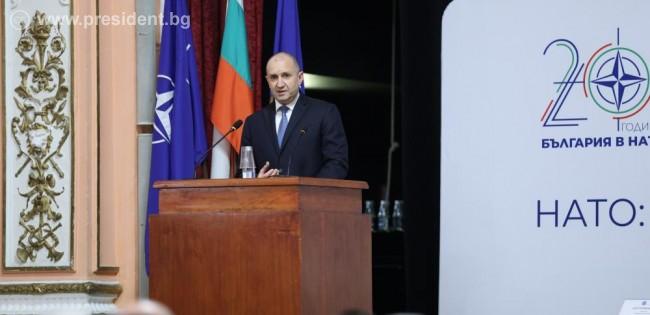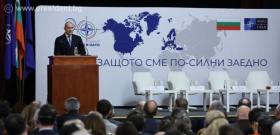 29 March 2024 | 17:27
29 March 2024 | 17:27
Radev: Membership in NATO Is Responsibility towards Our Own Security and This Means Building Adequate and Modern Defence Capabilities
Bulgaria's membership in NATO is above all a responsibility towards our own security, and this means building adequate and modern defence capabilities. This was stated by President Rumen Radev, who today participated in the national conference "20 Years of Bulgaria in NATO: Because We Are Stronger Together". The event was part of the program to mark the 20th anniversary of this country's accession to the North Atlantic Treaty Organization, which on 4 April will mark 75 years since its establishment.
The head of state defined as extremely wrong the narrative from the first years of this country's accession to the Alliance, that there is no need to make efforts for modernisation and exercises, since "NATO will protect us and there is someone to watch over our security". Rumen Radev called for the continuation of concerted efforts to place defence issues at the centre of society in order to solve the acute personnel shortage, which is dangerously deepening, as well as regarding the debate on the military training of citizens.
The sharing of progressive tactics and procedures, models of personnel training, the creation of which requires experience and colossal financial, scientific and human resources, as well as joint exercises, are an indicator of the power of being together, the President pointed out. The head of state also highlighted the importance for motivation of the essential factor in defence - the human factor, as well as the role of modern defence equipment for our Armed Forces.
Rumen Radev emphasised again that after decades, the strategic concept of the Alliance had finally returned to its real and most important mission - guaranteeing the sovereignty, independence, and territorial integrity of the member countries. This requires speeding up the process of modernisation of the Bulgarian Armed Forces, deepening the relationship between defence science and industry and greater investments in the field of defence. According to the President, allocating 2% of GDP to defence in the context of current crises and challenges should not be seen as a ceiling, because many member states allocate 2.5%, even 3% of their GDP as necessary to guarantee their defence.
For 15 years the modernisation of the Armed Forces was frozen and as president I made three consecutive meetings of the Security Advisory Council at the beginning of the first term to start something happening, the head of state reminded. Rumen Radev also pointed out that the program for investment projects of the Bulgarian Army until 2032, which was optimised for six months by the current government, was finally submitted to the parliament on 30 November, but is not yet adopted by the National Assembly. For me, these are important signs and it is high time for the Bulgarian parliament to take it seriously while a war is raging near us, the president emphasised.
The Head of State also noted that the Report on the State of Defence and the Armed Forces, despite the topic being repeatedly raised, lacks low-budget projects for the modernisation of the Armed Forces through unmanned systems and the acquisition of new technologies for radio-electronic warfare, surveillance, communication, intelligence, coordination, targeting and striking that provide superiority and asymmetric advantage in modern military conflicts.
In his address at the national conference, Radev highlighted the historical contribution and organisational efforts of a number of institutions, Bulgarian diplomacy and our allies, for Bulgaria's accession to NATO and the importance of this country's belonging to a space of shared democratic values, freedom and peace, respect for human rights and the rule of law.
 The presidential institution is following developments in the Middle East with concern
The presidential institution is following developments in the Middle East with concern
 President Iotova Discussed the Growing Hate Speech and the Retreat from Human Rights with the CEO of the American Jewish Committee, Theodore Deutch
President Iotova Discussed the Growing Hate Speech and the Retreat from Human Rights with the CEO of the American Jewish Committee, Theodore Deutch
 President Iliana Iotova Met with Croatian Prime Minister Andrej Plenkovic
President Iliana Iotova Met with Croatian Prime Minister Andrej Plenkovic
 Presidents Iliana Iotova and Ilham Aliyev Discuss Energy Cooperation between Bulgaria and Azerbaijan
Presidents Iliana Iotova and Ilham Aliyev Discuss Energy Cooperation between Bulgaria and Azerbaijan
 The President: The Inclusion of Bulgarians in the Constitution of the Republic of North Macedonia Is an Indispensable Condition for Its EU Membership
The President: The Inclusion of Bulgarians in the Constitution of the Republic of North Macedonia Is an Indispensable Condition for Its EU Membership
 The Head of State: Europe Has Realised That It Is Time to Take Its Destiny into Its Own Hands
The Head of State: Europe Has Realised That It Is Time to Take Its Destiny into Its Own Hands
 President Iotova: The Urgent Resolution of the Problems Facing Bulgaria Depends on the Shared Responsibility between the Caretaker Cabinet and the National Assembly
President Iotova: The Urgent Resolution of the Problems Facing Bulgaria Depends on the Shared Responsibility between the Caretaker Cabinet and the National Assembly
 Rumen Radev: Like All Bulgarians, I believe that with Joint Efforts We Can Change Bulgaria
Rumen Radev: Like All Bulgarians, I believe that with Joint Efforts We Can Change Bulgaria





 2026
2026